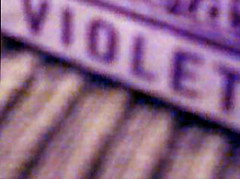Pippin. The Mark Taper Forum. 2/24/09.
Deaf West Theatre and CTG have produced a truly magical production of Pippin. An extraordinary cast and a thorough reworking of Stephen Schwartz's 1972 musical make this show captivating and refreshing. They streamlined the show's book, cut some songs, did the whole thing in sign language, and made me fall in love with this musical all over again.
Most striking in this production were the actors playing Pippin: Michael Arden (singing) and Tyrone Giordano (signing). By doubling the character, these two actors made Pippin into a much more compelling character than he often appears. For the first time, I didn't find Pippin vapid and self-centered as a character, and I wasn't bored during his long, solipsistic solos. Arden's voice was strikingly beautiful and incredibly expressive while Giordano's signing and acting allowed the character to emote with his body at the same time. Usually, Pippin is the least interesting thing about Pippin, and in this production, that wasn't the case. The decision to bifurcate the character was a stroke of genius, and while I'm not entirely convinced by the decision to have the two versions of Pippin interact at the climax of the play, watching the two Pippins enlivened the whole production.
The revised book, including the added song "Back Home Again" solved many of the problems with Pippin's pacing. They did the whole thing straight through without an intermission, which is the way it should be (otherwise Act II drags - a lot). Unfortunately, this means they cut "Extraordinary," which is a fairly important song to express Pippin's character, and which is echoed frequently in the show's book. I think they'd be better off keeping at least one verse of the song to help develop Pippin's character.
Visually, director Jeff Calhoun's production emphasizes magic, literally, rather than the spectacular theatricality that generally frames the show. Instead of actor/dancers, the the Leading Player (played by Ty Taylor) is costumed as a magician with some of the players as magicians' assistants. While the production does its best to emphasize this idea of magic through recurring stage tricks, shortchanging the theatricality undermines the sense of the ensemble as a theater company and the sense of group bonding and character that Pippin usually has. The players are usually a lot more compelling than Pippin, and that certainly isn't the case here. The ensemble, like the Leading Player, are less seductively threatening than usual in this production. Although Taylor's performance was fine and his voice strong and sexy, I just didn't find myself compelled to watch him. This may have been because the staging placed him front and center while my seat was off to the side of the 3/4 round thrust stage. Because this show was originally a Fosse show, replacing the dancing with signing makes for a few disappointments. Without the dancing, "Magic to Do" and "War is a Science" are a lot less fun than they could be, although "On the Right Track" had just the right mix of choreography and sign language to be a joy to watch.
My major concern with the production was that the emphasis on magic casts the female players as magicians' assistants. Pippin is already not a very feminist show (although the show-stopping star turn for Pippin's earthy grandmother, played in this production by Harriet Harris, is always fabulous); reducing the female ensemble from a group of sexy Fosse dancers to four girls who flourish a lot with their hands is extremely disappointing. This LA Times blog article emphasizes how the production replaces dancing with hands, and that first moment in which hands emerge from the stage is indeed a pure moment of theatrical magic, but I think the production overuses this gimmick at the expense of fragmenting the women's bodies, reducing them to just hands and arms rather than whole people. The girls were fine, but I felt like they were just there to make 'ta-da' gestures and fill out the orgy scene. Similarly, the much-needed trimming of the second act reduces the role of Catherine (played by Melissa van der Schyff). Portraying and costuming her as a country-western star was an extremely clever decision that showcased van der Schyff's voice well, but the role as ordinary housewife and love interest is still only moderately developed and serves as a marker to frame Pippin's story. From a feminist perspective, the women in this play almost might as well not be there, and this production exacerbated rather than ameliorated their irrelevance.
Despite some minor complaints, however, I give this show a hearty recommendation. I thoroughly loved the performance and I'm delighted by Deaf West's innovative theatricality.
I Interview Playwrights Part 1124: Sophie McIntosh
-
*photo by **Nina Goodheart*
Sophie McIntosh
*Hometown:* Sun Prairie, Wisconsin!
*Current Town:* Brooklyn.
*Q: What are you working on now?*
A: I’m ...
2 weeks ago

0 comments:
Post a Comment